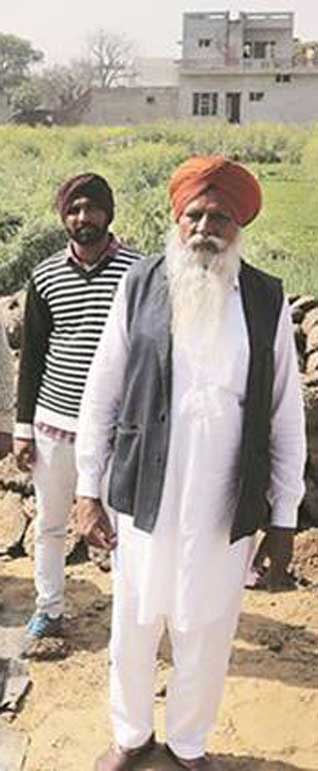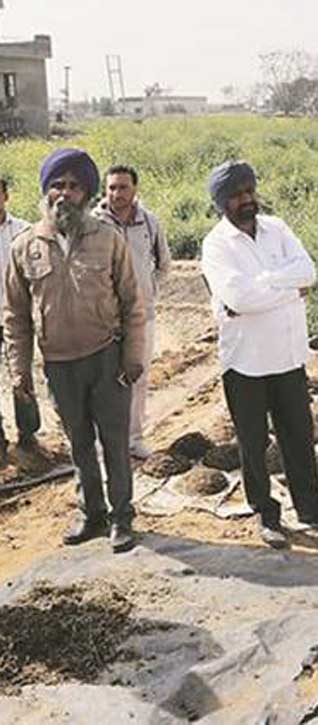People
Claiming Descent From Hindu Deity Krishna,
Punjab’s Yadav Sikhs Take On Local Mores
RAAKHI JAGGA
To the casual eye, Jarnail Singh is any other turbaned, bearded Sikh farmer owning 10 acres in this village of Patiala’s Patran tehsil.
The giveaway, though, is the ‘Yadav’ surname he and his three sons -- Darshan Singh, Jasbir Singh and Kashmir Singh -- use.
“We are Ahir Yadavs and traditionally worshippers of Lord Krishna. It is our forefathers who settled in these parts and decided to follow the rule of ‘jaisa des vaisa bhes’ (a Bihari variant of ‘When in Rome, do as the Romans do’).
They started wearing turbans and taking on Punjabi first names along with adding Singh.
“Today, we are proud Sikhs,” declares Jarnail Singh Yadav, whose family farms 25 acres, including 15 acres land taken on lease.
Currently busy constructing a spacious house on the main Patran road about four km off his village, the 63-year-old is the president of the ruling Shiromani Akali Dal’s ‘Parvasi’ (migrant) wing in Patiala district.
“We are originally from Rewari, which is now part of Haryana. Our people came here early last century as farm labourers. Over a period, we became landowners and also adopted Sikhism,” says Jarnail Singh, giving a one-shot summary of his community’s progress.
Punjab has an estimated 35,000 Ahir Yadav Sikhs, concentrated in some 26 villages of Patiala and Sangrur districts. The community makes up roughly a third of Dugal Kalan’s 3,500-plus population. Ahir Yadav Sikhs are also there in large numbers in nearby villages such as Devgarh, Bhootgarh, Dhur, Hariau Kalan and Nihal Garh.
Most of them own land today. Meha Singh Yadav, who is in his mid-eighties, credits landownership among his clansmen to the Kirat Lehar militant agrarian movement led by Teja Singh Swatantra. This movement, which was mainly in the erstwhile PEPSU (Patiala and East Punjab States Union) princely region, resulted in ownership rights for many who, for decades, were tilling the lands of others.
“We were four brothers who got 10 acres each in the early fifties just after Independence. Now, I have 22 acres, which includes new land acquired through investing surpluses from intensive farming. We always worked hard. And, once we got some land, there was no looking back,” recalls Meha Singh.
Jarnail Singh Yadav -- whose 10 acres is from the 20 acres that his father and uncle received over six decades ago -- admits that without the Kirat Lehar movement, “we would have continued to work as labourers in the fields of landlords”.
Besides land, many Ahir Yadav Sikhs -- that includes Meha Singh and Inder Singh -- also own harvester combines and reapers. These machines they take to Haryana, Madhya Pradesh and Gujarat for harvesting the wheat and paddy from the fields of other farmers.
“My brother looks after our farm, while I go with my men and machine to these states where we do harvesting on a custom-hiring basis. I make a couple of hundred thousand rupees every season,” notes Inder Singh, whose family has 20 acres in Dugal Kalan.
Mishra Singh Yadav and Karnail Singh Yadav are Panchayat member and Nambardar (revenue officer), respectively of Nihar Garh village in Sangrur district’s Sunam tehsil. Both take pride in being turbaned Sikhs and frequenting the gurdwara at their village, which has no temple.
“We could very well have lived without wearing turbans. But adding Singh to our names makes us feel we belong to this area. Living in Punjab as Sikhs has made us grow and become owners of both land and machines,” points out Mishra Singh.
In the past 3-4 years, however, the community has also begun celebrating Krishna Janmashtami organised by the Yadav Sabha in Patiala city. “We are, after all, from the kul (clan) of Lord Krishna and it is only appropriate we commemorate his birthday as well,” adds Mishra. The Yadav community, stemming from the Hindu belt primarily consisting of the provinces of Bihar and Uttar Pradesh, has traditionally plied the trade of the 'gauwala' or milkman.
In November, ahead of the Assembly elections, the Akali Dal-led government in Punjab granted OBC ("Other Backward Class") status to Ahir Yadavs, a longstanding demand of the community.
“We are farmers. But our younger generation wants to go beyond agriculture, which is not as lucrative as it used to be. Reservation in government jobs and educational institutions should help in this direction,” feels Jarnail Singh Yadav.
[Courtesy: Indian Express. Edited for sikhchic.com]
March 2, 2017
Conversation about this article
1: M Kaur (Canada), March 04, 2017, 1:55 PM.
I think this is exactly what is wrong with the system in Sikhi. All these Hindus have taken on the guise of Sikhs and benefitted from everything that being a Sikh has to offer but at the end of the day when 'push comes to shove' they revert back to their Hindu roots. This is exactly what happened in 1966 (Punjabi Suba), 1984 (Anandpur Resolution) and 1990s (Genocide against Sikhs), and this will happen again should the Sikhs ever push for independence or Sikh rights. Is wearing a turban and having a Sikh name enough to qualify being a Sikh? What about loyalty to the Panth and its causes? This is what is watering down Sikhi and is the true threat to the survival of the Sikhs.




